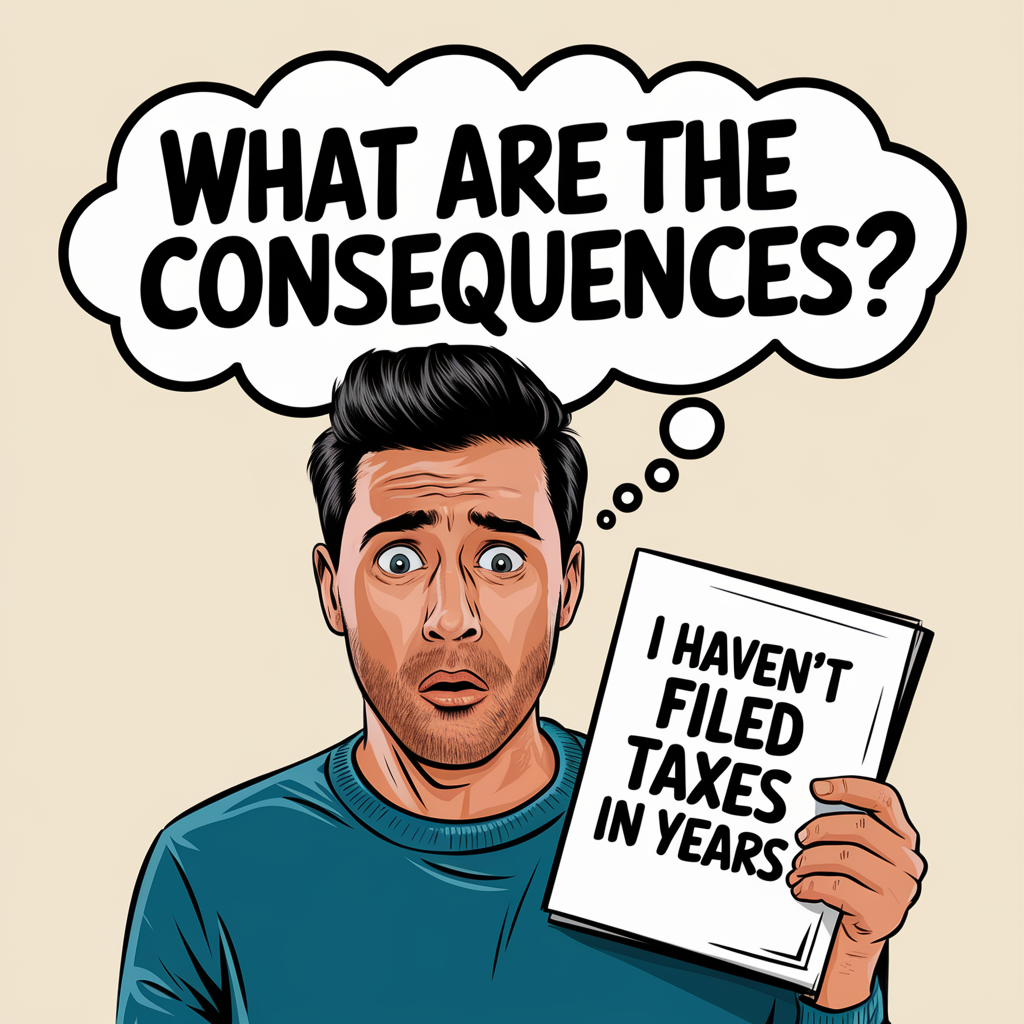Haven’t Filed Taxes in 5 Years? Consequences & Options

- What to expect if you haven’t filed taxes in five years
- IRS notices and enforcement actions
- What happens if you haven’t filed business taxes
- How the IRS files a Substitute for Return (SFR)
- Filing your back taxes even if you’re missing documents
- Why you should file as soon as possible—even if you can’t pay
- How to get professional help to resolve your tax issues
- Failure-to-file penalty: 5% per month (up to 25% of the total tax due)
- Failure-to-pay penalty: 0.5% per month (up to 25%)
- Interest on unpaid taxes: Accrues daily based on current IRS interest rates
- Tax liens: The IRS places a legal claim against your property
- Wage garnishments: The IRS takes a portion of your paycheck
- Bank levies: The IRS seizes money directly from your bank accounts
- Seizure of assets: The IRS can take personal or business assets to satisfy the debt
- The IRS only includes known income (W-2s, 1099s, etc.)
- No deductions, credits, or business expenses are included
- The result is an inflated tax debt that is harder to reduce
- CP59 Notice: First notice informing you of unfiled returns
- CP2566 Notice: IRS intent to file a Substitute for Return
- CP504 Notice: Final warning before levy action
- Notice of Federal Tax Lien: Public record showing you owe taxes
- Intent to Levy Notice (LT11 or CP90): Final notice before the IRS seizes assets
- Higher tax liability: The IRS assumes maximum profit with no deductions
- Loss of deductions & credits: Business expenses and write-offs are forfeited
- Payroll tax penalties: If you had employees and failed to file payroll taxes, penalties can be severe
- Potential criminal charges: If the IRS believes there is willful tax evasion, legal consequences may follow
- Installment Agreements: Pay over time
- Offer in Compromise (OIC): Settle for less than owed
- Currently Not Collectible (CNC): Temporary relief if you can’t afford payments
Frequently Asked Questions
What happens if I haven’t filed taxes in 5 years?
The IRS may create substitute returns, assess balances without deductions, and pursue enforced collections.
Is it too late to fix it?
No. You can still file voluntarily and potentially qualify for penalty relief or settlement options like an Offer in Compromise.
What is a Substitute for Return (SFR)?
An SFR is when the IRS files for you using only W-2s, 1099s, and no deductions or exemptions. It usually results in a high balance owed.
Can I still claim refunds or credits?
You have a 3-year window to claim refunds. After that, they’re permanently lost—even if you qualify for one.
What enforcement actions can the IRS take?
The IRS can issue liens, levy your bank accounts, garnish wages, or assign your case to a Revenue Officer.
Can a local CPA help with both IRS and FTB filings?
Yes. An Orange County CPA can help you reconstruct records, file both IRS and California FTB returns, and build a resolution strategy.
📣 About the Author
Marc Boulanger, CPA is the founder of Boulanger CPA and Consulting PC, a boutique tax resolution firm based in Orange County, California and trusted by high-income individuals and business owners across Southern California.
He is the author of Defend What’s Yours: A California Taxpayer’s Guide to Beating the IRS and FTB at Their Own Game, available now on Amazon. The book offers a step-by-step plan for resolving IRS and FTB tax debt without losing your business, your home, or your peace of mind.
With over a decade of experience resolving high-stakes IRS and State tax matters, Marc brings strategic insight to complex cases involving wage garnishments, bank levies, unfiled returns, and six-figure tax debts. He is known for helping clients reduce or eliminate tax liabilities through expertly negotiated settlements and compliance plans.
Marc is a Certified Public Accountant licensed in California and Oklahoma and holds the designation of Certified Tax Representation Consultant. He is a member of the American Society of Tax Problem Solvers (ASTPS) — the national organization founded by the educators and practitioners who have trained thousands of CPAs, EAs, and tax attorneys in IRS representation strategy.
Every case is handled with discretion, proven methodology, and direct CPA-led representation — not call center scripts.
📍 Learn more at www.orangecounty.cpa or call (657) 218-5700.










